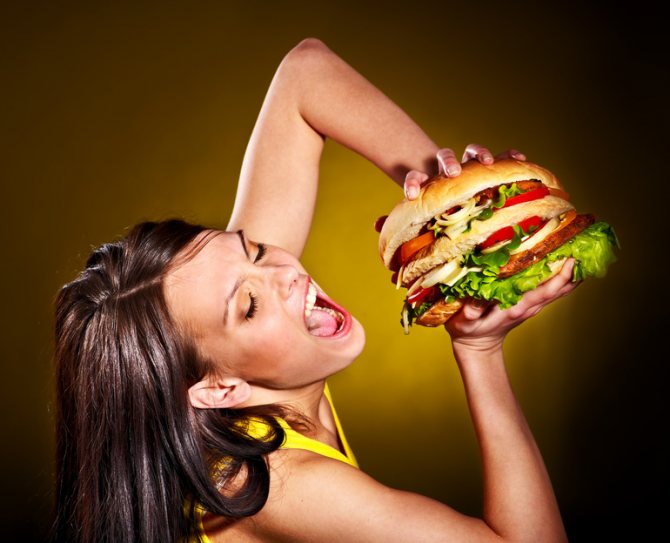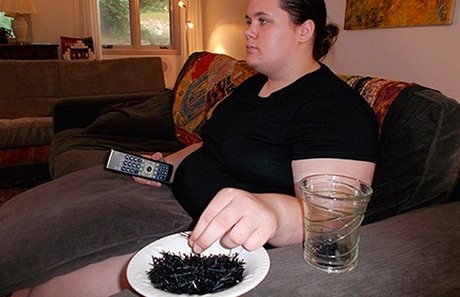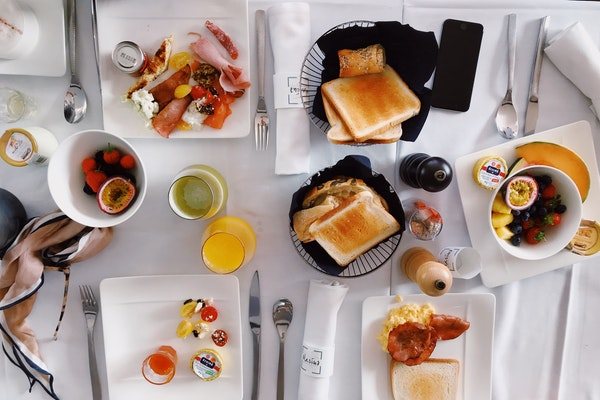WHO (World Health Organization) experts told the world that by 2025, obesity will reach 50% of women and 45% of men worldwide. The scale is impressive. It is clear that obesity is a consequence of overeating; without overeating, there will be no obesity. But what makes people overeat so massively? The reason for this has recently been found, named and even classified. It's called "food addiction." The dictionary says that addiction is an obsessive, unhealthy need for something, that is, a disease.
[back to contents]
Types of food addiction
Experts distinguish three types of food addiction: overeating or gluttony, bulimia and anorexia. The last two are serious mental illnesses that pose a threat to life. Anyone who is trying to fight excess weight on their own – with a home-grown diet or something else – should definitely know about them.
Bulimia is a nervous disease that results in a person filling his stomach with food to the limit and even more. There were cases when the walls of the stomach cracked from overfilling. With bulimia, having filled the stomach to capacity, a person then empties it by vomiting “so as not to gain weight.” Such eating behavior is fraught with the development of a conditioned reflex that will force the stomach to eject any contents automatically, in addition to the person’s desire.
Anorexia is a mental illness in which a person experiences such aversion to any food that he cannot bring himself to eat anything. The disease can result in a slow death of starvation.
Overeating, in other words, gluttony, is not as dangerous as anorexia and bulimia, but it is also not a gift, because it is guaranteed to lead to obesity, and obesity means diabetes, hypertension and a bunch of other diseases.
Can't you stop? This is food addiction!
[back to contents]
What is bulimia? Definition
The full medical name for this pathology is “bulimia nervosa.” For the first time, doctors began to talk about this disease in the 40s of the last century. However, bulimia was officially recognized as a disease only in 1980. Then she was given the status of an “eating disorder.” But already in 1992, the pathology was recognized as a mental disorder. At the same time, she was assigned her own diagnostic code. Today, in the ICD-10 classification list, the disease is listed under the serial number F50.2.

What is it? According to the accepted definition, this is a disorder of nervous activity, which is characterized by excessive, uncontrolled absorption of food, alternating with artificially induced vomiting and periods of exhausting diets and sports activities. The cycle of eating and vomiting occurs amid extreme preoccupation with one's own weight.
Causes of food addiction
As strange as it sounds, the mechanism by which dependencies arise is still unknown. It is believed that it lies in the field of psychology and the roots of the problem may go back to early childhood. People prone to introspection can themselves remember at what point their “special relationship” with food began. In addition to psychological reasons, economic and social reasons may be involved in the process. If you can’t figure out this “tangle” on your own, you need to seek help from a specialist - a psychotherapist or psychoanalyst, because you cannot get rid of the addiction without eliminating the cause.
Distinctive characteristics of addicted people:
- I am constantly haunted by thoughts about food: what to eat when it’s already lunch (dinner, etc.), where to find out a new recipe, what to buy for dinner - these thoughts are obsessive, they “go in circles.”
- The desire to eat at night, the person wakes up in the middle of the night and empties the refrigerator.
- The desire to “seize” troubles of any scale. It doesn’t matter whether it’s a minor or major nuisance - the desire to “eat it up”, that is, to compensate for stress with the pleasure of food, is a dangerous sign of the onset of food addiction.
If there is no favorite food in the house, “withdrawal” begins - the mood sharply deteriorates, the person is ready to go to the store for it at any time of the day.

People with food addiction try to sneak to the refrigerator while no one is looking. Even at night
But that’s not all. Here are the signs by which you can accurately determine that a person has a food addiction:
- you can’t stop, tear yourself away from food;
- the plate is completely emptied, despite its size;
- a whole bar of chocolate or an entire bag of sweets is eaten, although at first I only wanted to try a little;
- the inability to share your favorite food even with loved ones, the desire to eat something alone; After such a meal, a person is haunted by remorse, but everything repeats itself again.
[back to contents]
How do you know if you should avoid junk food?
Avoiding junk food completely may seem impossible. It is everywhere and is a big part of modern culture. However, in some cases, complete abstinence from certain trigger foods may be necessary. Once you make a firm decision to never eat these foods again, avoiding them will become much easier. Because the need to justify or not eat them is eliminated. Cravings may also disappear or decrease significantly.
Consider writing a list of pros and cons to help you think through a decision.
- Pros. These may include weight loss, living longer, having more energy, and feeling better every day.
- Minuses. This may include not being able to eat ice cream with family. Lack of “goodies” during a holiday at the resort and the need to explain the choice of food.
Write everything down—no matter how weird or conceited it may seem. Then compare the two lists and ask if it's worth it. If the answer is yes, rest assured that this is the right decision. Also, keep in mind that many of the social dilemmas that may appear on the list can often be easily resolved.
SUMMARY To overcome food addiction, a person must be confident that eliminating certain foods is the right thing to do. If there is uncertainty, writing down the pros and cons will help make a decision.
How to get rid of food addiction
First, you can try to do it yourself using this algorithm:
- Motivate yourself correctly. To do this, you need to clearly understand that getting rid of addiction is necessary to avoid diseases that are often incompatible with life. Find yourself a purpose worth living for.
- Create a nutrition system for yourself based on using only healthy foods, prepared in the right way. You shouldn’t give up your favorite foods and dishes abruptly. You need to set aside one day a week (or month) when you can eat them in small quantities. Then weaning off unhealthy but favorite foods will happen gradually.
- Find an activity that distracts you from thinking about food, some hobby, and draw pleasure from there, and not from the plate. It would be ideal if this hobby would be sports, but any other activity is also suitable, the main thing is that it is captivating.
- Increase self-esteem. All people with addictions have a common “Achilles heel” - low self-esteem. They don't love themselves and their body. Working on self-esteem is not as difficult as it may seem. A method recommended by psychologists around the world is to keep a diary where all achievements are recorded. You need to do this every day, then your consciousness will learn to focus on merits and victories, and self-esteem will grow.

A good way to combat eating in front of the TV. If you are used to going on vacation with a plate and cup, take into account
If you can’t cope with an unhealthy appetite on your own, you need to consult a specialist - a psychologist or psychotherapist. They will act using traditional methods that eliminate dependencies. This could be group therapy, gestalt therapy, family therapy. You can also consider an option such as coding. There is no need to be afraid - food addiction is treated not with medications, like alcohol addiction, but with hypnotic suggestion.
[back to contents]
How is bulimia diagnosed?
As a rule, the first reaction when using the phrase “food addiction” is how to get rid of it? A psychological problem cannot be solved overnight. Like any other disease, bulimia needs diagnosis. And only after it has been carried out comes the turn of therapy.
To identify this pathology, an attitude test towards food intake is used, its original name is the Eating Attitudes Test. However, doctors usually use the abbreviation EAT-26. This technique is quite old, so there is no doubt about its reliability. The testing system was developed in Toronto in 1979 at the Clark Institute of Psychiatry.
Based on this test, many other methods have been developed, however, it is the main method that doctors use to determine the presence of food addiction in a patient.
Preventive measures
Never reward yourself with food, so as not to develop a harmful conditioned reflex. Instead of eating, use other opportunities to pamper yourself - a pleasant purchase, the opportunity to lie in bed.
Never force feed children when they have no appetite. Don't force them to finish eating if they are already full.
Eat food only in the designated area. If you eat several times at work, or in front of the TV, you will very soon not be able to go there without taking food with you.

You will never become addicted to such food
An unhealthy addiction to food doesn't happen out of nowhere. Emotional trauma, low stress resistance, internal conflicts and bad family scenarios need to be corrected in time with the help of a psychologist. You can also learn relaxation skills and the ability to develop healthy eating habits from him.
STRESS
Is your day like Groundhog Day? Work-home-family-work. And after each point there is food. There is nothing in your life that would allow your brain to produce joy hormones, and delicious food copes with this task perfectly and quickly.
WHAT TO DO?
Sit down and think carefully about what you can do to replace chocolates and fast food. These should be things that also make you happy. It could be anything: reading books, knitting, watching TV series, talking with family, cycling. The main thing is that this activity brings you true pleasure, which will replace regular eating of sweets.
LACK OF PHYSICAL ACTIVITY
Physical activity also reduces cravings for overeating. Firstly, because they contribute to the release of endorphins, which provides an excellent mood, and a person ceases to need external nutrition. And secondly, after a high-intensity workout, you hardly want to devalue all your work with a pack of greasy fries.
WHAT TO DO?
Study! Go to the gym, to the pool, to dance, boxing, Pilates, stretching, ride a bike, play volleyball, in general, anything, the main thing is that you like it. This way you kill three birds with one stone: physical activity; a hobby that brings pleasure; and another great way to get rid of stress. By the way, there is a fourth hare: with the help of sports you will quickly lose weight.
AVAILABILITY OF PRODUCTS
It is very difficult not to eat cookies if they are in a bowl in the kitchen and emit an amazing aroma. This is called “wanting with your eyes.” If these cookies weren’t there, you wouldn’t even remember about them, but would continue to go about your business.
WHAT TO DO?
The next time you go to the supermarket, categorically forbid yourself from buying unhealthy foods. The “well, I’ll want it anyway” argument doesn’t work. If you want, get ready, go and buy it at the local store on the ground floor. In general, get into the habit of buying sweets only when necessary, and not for future use. That is, when you realize that you really want to eat sweets, not because you are bored, not because it is a habit, and not because you are stress-eating, you can safely go and buy yourself your favorite treat with your head held high.

If your diet is low in vegetables, herbs, and complex carbohydrates, then your body will constantly “ask” for something tasty.
BOREDOM
Very often we eat not because we are hungry, but because we are bored. A lonely evening in the company of French fries and chocolate or endless runs to the refrigerator on weekends invigorates, no matter what. But subsequent approaches to weights are not.
WHAT TO DO?
It's simple. You need to do everything to avoid getting bored. Keep yourself busy with useful and interesting things as much as possible. To avoid laziness and procrastination, write a to-do list for each day at the beginning of the week. On Monday you will read a book, on Tuesday you will go to the park to feed the ducks, on Wednesday you will meet a friend, and on Thursday you will do an at-home yoga workout. By the way, don’t forget to come up with a plan B in case the book turns out to be boring and your friend has urgent things to do.

Very often we eat not because we are hungry, but because we are bored
UNBALANCED NUTRITION
Did you know that what you already eat in the morning affects what you eat next throughout the day? If your diet is low in vegetables, herbs, and complex carbohydrates, then your body will constantly “ask” for something tasty. This occurs due to regular spikes in glucose, sudden changes in mood and unreasonable temper.
WHAT TO DO?
Be careful about your diet. We are not telling you to measure your food intake and count calories, but at least a little analysis of what you eat is extremely necessary. If you start your morning with a bun and a cup of coffee with sugar, you are unlikely to be able to maintain food peace throughout the day. And if it’s oatmeal or scrambled eggs with toast, then the task of “not overeating” will become much more feasible. By the way, for the sake of experiment, try to increase the consumption of vegetables and herbs, and see how much the craving for harmful things weakens.









